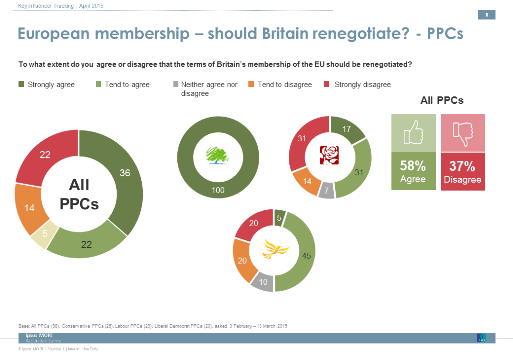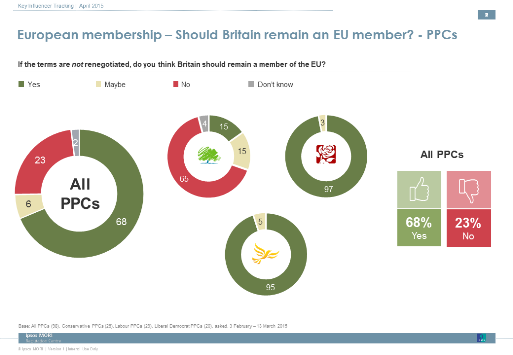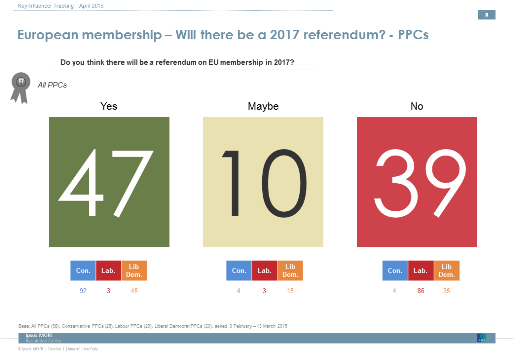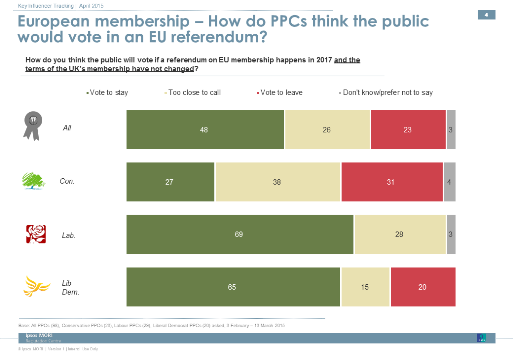PPCs toe the line on the EU
A recent Ipsos survey of potential parliamentary candidates (PPCs) reveals some interesting parallels, as well as discrepancies, between hopeful candidates and incumbent members of the same political parties on the subject of the EU.
When asked about whether Britain should renegotiate its terms of EU membership, current MPs are notably more inclined than PPCs to agree that renegotiation should happen with almost four-fifths agreeing compared to just under three-fifths of PPCs surveyed. Conservative candidates appear to be more aligned in their views with existing Tory MPs than Labour candidates are with current Labour MPs however. All Conservative candidates interviewed, for instance, agree the terms should be renegotiated for Britain with 98% of Tory MPs saying the same. Labour MPs, however, are significantly more in favour of renegotiation than the party’s candidates – 61% compared to 48%.


There is very little variation overall between MPs’ and candidates’ predictions for whether or not an in-out referendum will go ahead in 2016. Almost half (46%) of MPs say they think there will be a referendum and a very similar proportion (47%) of PPCs interviewed say the same. Conservative MPs, as one might expect, are much more inclined to say a referendum will go ahead than their Labour counterparts (92% compared to 3%). There is some inconsistency between MPs and candidates, however, when we look at the specific party figures. Again, candidates tend to express the party lines slightly louder than MPs. Eight in ten (80%) Conservative MPs, for example, predict a referendum and this figure rises to 92% amongst Tory candidates. Likewise, seven in ten (69%) Labour MPs say they do not think the British public will have a chance to vote on EU membership and this figure rises to 86% amongst the party’s current candidates.

MPs and candidates were also asked to envisage how the public would vote in an EU referendum, providing the terms of the UK’s membership had not changed. Just under half (48%) of PPCs interviewed say they think the public would vote to stay in the EU with 44% of MPs saying the same. Almost a quarter (23%) of the candidates surveyed say they imagine the public would vote to leave with a slightly larger proportion (29%) of MPs saying this. When it comes to the individual party differences, we see the same recurring pattern; namely, that candidates express their party lines to a greater extent than MPs. Seven in ten (69%) Labour candidates interviewed think the public would vote to stay in the EU compared to just six in ten (61%) Labour MPs. Likewise, just under three in ten (27%) Conservative candidates predict the public would vote to stay in the EU compared to just over three in ten (33%) MPs.

There is clear evidence that candidates for both the Labour and Conservative parties tow the party lines when it comes to the EU, albeit with slightly greater force than incumbent MPs in some cases. This suggests there will be minimal change in policies around these particular issues in the new Parliament. The main point of interest for Britain’s future relationship with the EU remains – and that is who will gain power post 7th May 2015.
Ipsos’s Survey of MPs runs biannually in the summer and winter. We interview c.100 MPs face-to-face each wave. Results are weighted to be representative of the house in terms of party and ministerial status. Results in this article are from fieldwork conducted in November/December 2014.
Ipsos’s Survey of Prospective Parliamentary Candidates runs in the months before the general election. We interview c.100 candidates for election in marginal seats, defined as those needing less than a 15% swing to displace an incumbent. Interviews are carried out face-to-face. Results in this article are from fieldwork conducted in February/March 2015



